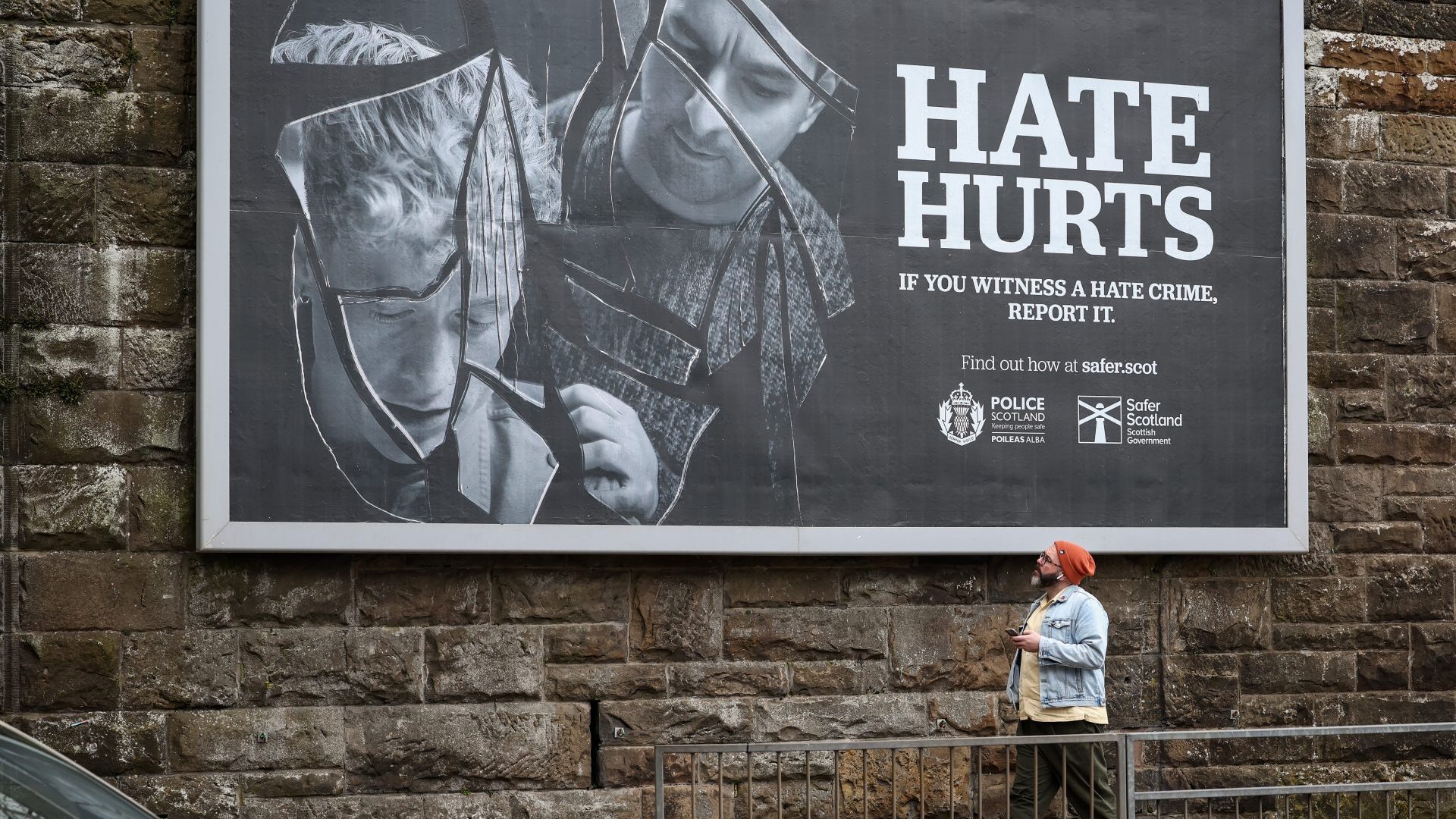Since it is likely that Labour will be in power by the end of the year, now is the time for progressives to get their house fully in order and to renounce as many stupid ideas as possible. In which context: the SNP has just done us all a big favour by showing how absurd, pointless and counter-productive hate speech laws are.
In an apparent effort to turn the whole of Scotland into a safe space, the Hate Crime and Public Order (Scotland) Act, which came into force on April 1, criminalises speech intended to “stir up hatred” based on prejudice against age, disability, religion, sexual orientation, transgender identity and variations in sex characteristics (note that, mysteriously, misogyny is not included in this list of bigotries).
The law’s introduction has been an unmitigated disaster. Last week alone, Police Scotland received around 8,000 reports of alleged hate crime and have had to pay staff overtime to handle the sheer volume of calls. The reassurance offered by the Scottish first minister, Humza Yousaf, that there was “absolutely no evidence” that the new law would prompt vexatious complaints seems to have been – well – a touch naive.
He was also made to look a fool by JK Rowling, who posted on X that she stood by her position that transgender women remain biologically male; and dared the police to arrest her. Yousaf declared her remarks “offensive and upsetting”. But the police judged them neither criminal nor worthy of record as “non-crime hate incidents”.
Interestingly, the first minister himself has so far been the subject of more complaints than the Harry Potter author. He must be wondering if performative law-making is all it’s cracked up to be.
To be clear: I am not, and have never been, a free speech absolutist. Incitement to violence or racial hatred, threatening language, slander, false advertising: there are many categories of speech that a democratic system should ban or restrict. What matters is that there ought to remain a presumption in favour of free expression.
Until very recently, progressives were the most passionate champions of this position. The great abolitionist Frederick Douglass, Martin Luther King Jr, Malcolm X, Mario Savio: all were powerful defenders of free speech as the foundation of every other freedom.
As the late US congressman John Lewis observed: “Without freedom of speech and the right to dissent, the civil rights movement would have been a bird without wings.”
The SNP’s idiotic new law perfectly encapsulates the almighty U-turn that has swept progressive thinking in the past 20 years: the shift towards no-platforming, speech codes and cancel culture (yes, it does exist, even if it’s renamed “consequence culture”).
The banner under which the legislation has been introduced is: “Hate hurts”. Which is true, if by “hurt” you mean emotional distress. The problem is that this two-word slogan embodies the most egregious error in the new approach to speech – which is the claim that words are not just metaphorically, but literally, violence.
And this is plainly nonsense. Words may lead to violence. But it is something else entirely to describe speech as, in itself, “assaultive” as though (for example) the offence caused to some Muslims by Salman Rushdie’s The Satanic Verses was morally and neurologically equivalent to the pain the novelist felt when he was stabbed more than 10 times in August 2022.
Perhaps the Kouachi brothers were genuinely outraged by the cartoons of Mohammad published by the Parisian magazine Charlie Hebdo. But their distress was as nothing compared to the agony felt by the 12 people they shot dead and the further 11 they injured at its offices in January 2015.
As the New Yorker writer Adam Gopnik put it after the atrocity: “It is not merely that an assault on an ideology is different from a threat made to a person; it is that it is the opposite of a threat made to a person. The whole end of liberal civilisation is to substitute the criticism of ideas for assaults on people.”
Let us acknowledge that, whatever Donald Trump, Viktor Orbán and Suella Braverman may hope to the contrary, 21st-century societies are going to become more pluralistic, more diverse, more multifarious. The needs of the labour market, the acceleration of population mobility, and – an underestimated factor – greater longevity mean that we are all going to be living in an advanced techno-Babel, in which different cultures, classes, religions and generations are engaged in constant and often cacophonous dialogue.
One way of regulating speech in such societies is to embrace the erroneous idea that words can be violence and ban all expression that is, or could be, insulting, offensive, disconcerting or distressing. It should be immediately apparent that such a society would be one of stultified silence.
As the Supreme Court Justice, Oliver Wendell Holmes Jr, put it in 1919: “Every idea is an incitement”. If the only criterion for the restriction of speech is that it might offend someone, then we may as well all shut up indefinitely; reducing our communications to the bare minimum using a special, super-safe, smiley-face semaphore.
It is also worth pointing out that hate speech laws have never worked. In 2011, a UN High Commissioner for Human Rights study concluded that “massive criminal regulations” did “not seem to have made a meaningful contribution to reducing racism or… discriminatory conduct.”
In December 2015, the European Commission against Racism and Intolerance reported its concern that, in practice, such legislation can be enforced “to silence minorities and to suppress criticism, political opposition and religious beliefs” and that the very groups it was intended to protect “may have been disproportionately the subject of prosecutions”.
Now, yet again, such legislation is failing. I was pleased to hear Pat McFadden, Labour’s national campaign chief, say that the party will not “create new crimes in this area”. The lesson from Scotland is clear.
It’s time to dump toytown politics and prepare for the serious business of government.




